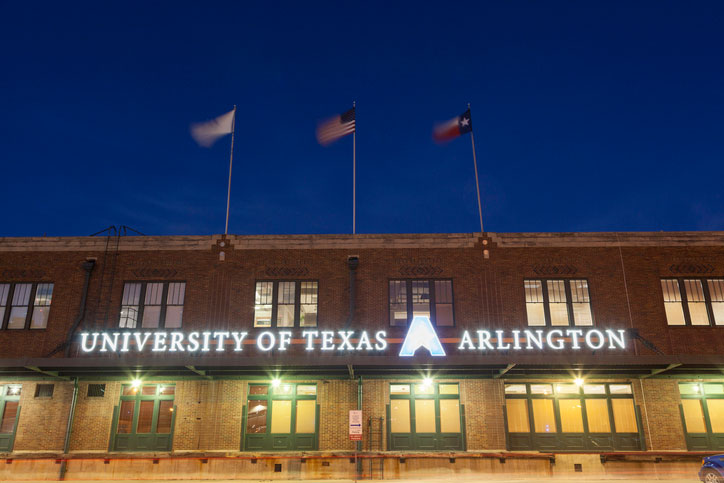Written by Helen Lewis

Arlington, Texas falls just between Fort Worth and Dallas, Texas, and is home to just under 400,000 residents.
Here, education is one of the city’s most robustly-employed sectors. According to the official City of Arlington website, almost 10,000 more Arlington residents work at the University of Texas at Arlington or in the Arlington ISD public school district than in any other field. General Motors is another major employer, as is Texas Health Resources. The average household’s salary in Arlington is $65,481.
Though Arlington’s population is slightly in decline, the city has become significantly more racially diverse over the last decade. Today, more than one-fifth of Arlington’s total population are immigrants.


Poverty is also decreasing in Arlington, falling by about 3.5% between 2015 and 2021.
Social Work in the City of Arlington, Texas
According to the Bureau of Labor Statistics, “Overall employment of social workers is projected to grow 7 percent between 2022 and 2032, faster than the average for all occupations.”
These roles can include jobs like:
- Clinical Social Worker
- School Social Worker
- Healthcare Social Worker
- Child Welfare Case Manager
- Mental Health Counselor
- Substance Abuse Counselor
- Family Therapist
- Geriatric Social Worker
- Hospice Social Worker
- Community Organizer
- Crisis Intervention Specialist
- Domestic Violence Advocate
- Rehabilitation Counselor
- Homeless Shelter Worker
However, social work is a field that encompasses so many different skills that these tools can be applied to a wide range of professions, including work in politics, nonprofits, education, corrections, natural disaster response, housing, and immigration.
Social Work with the Arlington Police Department
Social workers working within police departments play a crucial role in bridging the gap between law enforcement and the communities they serve, which can sometimes be fraught relationships.

In this field, social workers’ responsibilities can include crisis intervention, practicing de-escalation techniques during emergency situations. This can look like supporting police officers and communities safely resolving issues involving individuals experiencing mental health crises, domestic violence, substance abuse, or housing insecurity.
As professionals well-versed in available emergency resources, social workers in the police department can help to reduce an individual’s risk of incarceration by offering support and access to resources.
Social workers within police departments also proactively engage in community outreach and education initiatives to foster positive relationships between law enforcement and community members, critical links in communities where these relationships can be tense and antagonistic.
Social workers can be called on to organize and facilitate community meetings, workshops, and support groups to address concerns, build trust, and promote dialogue between law enforcement and residents. Additionally, they work to identify systemic issues contributing to crime and social disorder, advocating for policy changes and implementing preventative measures to address their root causes. By collaborating with various stakeholders, including local government agencies, nonprofits, and community leaders, social workers within police departments help to foster safer, more resilient communities while promoting social justice.
Arlington Public Schools Social Work
School social workers are key advocates for students, families, and communities. They conduct assessments of students’ emotional stability, behavior, and social performance to identify students in need of support, including issues like bullying, mental health, and abuse.
School social workers can collaborate with teachers, administrators, and parents to develop and implement intervention plans tailored to each student’s unique needs. These plans may include individual or group counseling, crisis intervention, and referral to community resources such as mental health services or social assistance programs.
In addition to designing educational programs focused on bullying prevention, conflict resolution, and diversity appreciation to create inclusive and supportive learning environments, social workers can be called on to work closely with teachers to address attendance issues, truancy, and barriers to learning. Outside of the classroom, social workers can act as powerful political advocates, speaking up for policies and practices that support student success based on their community’s needs. Through an interdisciplinary approach and commitment to fostering holistic development, school social workers contribute to creating nurturing school communities where all students have the opportunity to thrive academically and emotionally.
Mental Health Social Work

Social workers in the field of mental health care play pivotal roles in supporting at-risk and vulnerable individuals grappling with psychological distress. When it comes to providing care to patients, social workers operate within interdisciplinary teams, collaborating with psychiatrists, psychologists, and other mental health professionals to holistically support the people they serve. They offer crucial services such as therapy, counseling, and case management, aiming to empower clients to navigate their mental health journeys effectively.
Additionally, social workers continue their work with a patient outside of a one-on-one context.
One critical role social workers often step into is as an advocate: using personal professional experience with mental health care patients to speak up for clients’ rights and access to resources.
In this way, social workers can act as intermediaries between patients and Arlington’s mental health care system, helping their clients make use of resources provided by community organizations, government agencies, and healthcare institutions.
Social workers in mental health care are often also intimately connected to families and communities affected by mental health issues. This can take a number of forms: in group and family therapy, social workers can facilitate psychoeducational sessions and support groups, fostering understanding and solidarity among individuals facing similar struggles. Similarly, social workers can provide critical emotional support to communities recovering from traumatic events, such as natural disasters.
By addressing systemic barriers and advocating for inclusive policies, social workers strive to create environments that promote mental well-being and reduce stigma surrounding mental illness. Their holistic approach emphasizes not only symptom management but also the enhancement of social support networks and the promotion of resilience, ultimately contributing to the overall improvement of individuals’ quality of life.
Finding an Internship in Social Work in Arlington
Fieldwork and internships in social work are a key means of attaining an MSW degree and licensure, but also in preparing prospective employees for the challenging—but deeply rewarding—labor of social work.
If you’re interested in finding an internship in social work in Arlington, Texas, it might be wise to explore your options in ways such as:
- Researching Organizations: Using online search engines, job boards such as LinkedIn, Idealist, and Indeed, professional contacts, or resources at your university, learn more about organizations in Arlington that offer social work internships. This could include government agencies, non-profit organizations, hospitals, schools, and counseling centers.
- Networking: Is there someone you admire, or a field you’re especially curious to explore? Professional contacts can be a meaningful way of building a strong network and accessing future opportunities, as well as people you may be able to work with to access resources for your future clients. If you’re not sure where to start, seek out social work conferences, seminars, and networking events in Arlington.
- Directly Contacting Organizations: Identify organizations that align with your interests and career goals, then reach out to them directly to inquire about internship opportunities. If you’re not sure who to contact, the human resources department or internship coordinator could be the best place to start. In a brief, professional email, express your interest and ask about available positions.
- Volunteering: If you’ve found an organization that appeals to you, reach out to their volunteer coordinator to see if there are opportunities to get involved. Volunteering is a great, low-commitment way to see if you like the work and the workplace. If you particularly like the place where you volunteer, it can help you build connections within the community, and can even lead to internship opportunities in the future.
By utilizing these strategies and actively searching for opportunities, you can increase your chances of finding an internship in social work in Arlington, Texas.
MSW Programs in Arlington
The University of Texas at Arlington offers a Master’s in Social Work (MSW) program that it bills as the #1 “best college for social work in Texas.” According to the website of the UTA School of Social Work, the institution has also been ranked as the top online MSW program and the most affordable CSWE-accredited MSW program.
However, UTA is not the only college or university in Texas that offers a master’s degree in social work. Other local schools include Texas State University, Texas Tech University, Texas Christian University, Baylor University, University of North Texas, University of Texas at Austin, and the University of Houston.
MSW Programs at Fordham vs. UT Arlington
Fordham University is a private university based in the Bronx, New York City. The university is home to the renowned Graduate School of Social Service (or GSS), which offers BSW, MSW, and PhD programs in Social Work. This highly-ranked program is available in-person, online, or in a hybrid format. Students enrolled in Fordham GSS also have the opportunity to receive dual degrees, such as an MSW/MPH (Master’s in Public Health) or an MSW/JD (Juris Doctor, or Doctor of Law).
University of Texas at Arlington also offers in-person and online options. UTA does not offer dual degree programs like Fordham University does. However, students within UTA’s School of Social Work have the opportunity to cultivate specialties in social work through the use of minors like Diversity Studies, Social Justice & Social Welfare, and Substance Use Treatment. Students can also choose to get a Bachelor’s of Science degree in Substance Use & Treatment, a track that brings together biology, psychology, ethics, statistics, American history, and sociology courses.
Do I Need an MSW to Become a Therapist in Arlington?
In Arlington, Texas, you do not necessarily need a Master of Social Work (MSW) degree to practice as a therapist. While an MSW is a common pathway for individuals pursuing a career in therapy, there are alternative routes: for example, Texas allows individuals to become Licensed Professional Counselors (LPC) or Licensed Marriage and Family Therapists (LMFT) through different educational and licensing requirements. These pathways typically involve completing a master’s degree program in counseling or marriage and family therapy, followed by supervised clinical experience and passing a licensing exam.

An MSW is different from an LMSW or an LCSW, designations that mean that a social worker has received an official license from the state. Being a LCSW (Licensed Clinical Social Worker) means that someone is allowed to practice in clinical settings, sometimes with more specialized responsibilities than MSWs (such as offering diagnoses).
While it isn’t necessary to attain an MSW in order to practice therapy in Arlington, social workers are likely to earn higher salaries and have an easier time finding employment when equipped with an MSW.
Social Worker Salaries in Arlington
According to the Bureau of Labor Statistics, there is a wide range in salaries for social workers, with employees in this field earning anywhere from $32,730 to $97,280 annually. In some fields, such as healthcare, social workers in Arlington earn above the national average across occupations. Arlington social workers also have the opportunity to earn above the average for social work, a field in which the average American employee earns $55,530 annually (as of May 2022).
The table below offers a glimpse into the range of salaries—from the bottom 10% of earners to the top 10% of earners—available to social workers in Arlington across four categories. The final category, “Social Workers (All Other),” is broad enough that it may include such diverse positions as community organizers, homeless shelter workers, corrections social workers, grant writers, and crisis hotline counselors.
Social Work Specialty | 10% | 25% | 50% (Median) | 75% | 90% |
Child, Family, and School Social Workers | $37,000 | $45,780 | $47,800 | $62,130 | $75,030 |
Healthcare Social Workers | $44,190 | $51,370 | $65,270 | $77,250 | $81,390 |
Mental Health and Substance Abuse Social Workers | $32,730 | $35,230 | $42,220 | $49,830 | $65,730 |
Social Workers (All Other) | $39,910 | $52,000 | $74,880 | $78,770 | $97,280 |
Table data taken from 2022 BLS reports for the Dallas-Fort Worth-Arlington metropolitan area.
2022 US Bureau of Labor Statistics job market trends and salary figures for child, family, and school social workers, healthcare social workers, mental health and substance abuse social workers, and social workers (all other) are based on national data, not school-specific information. Conditions in your area may vary. Data accessed March 2024.





